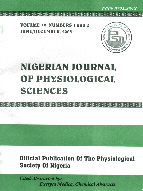
|
Nigerian Journal of Physiological Sciences
Physiological Society of Nigeria
ISSN: 0794-859X
Vol. 24, No. 1, 2009, pp. 73-78
|
 Bioline Code: np09012
Bioline Code: np09012
Full paper language: English
Document type: Research Article
Document available free of charge
|
|
|
Nigerian Journal of Physiological Sciences, Vol. 24, No. 1, 2009, pp. 73-78
| en |
The Comparative Effects Of Chronic Consumption Of Kola Nut ( Cola nitida  ) And Caffeine Diets On Locomotor Behaviour And Body Weights In Mice ) And Caffeine Diets On Locomotor Behaviour And Body Weights In Mice
Umoren, E. B.; Osim, E. E. & Udoh, P. B.
Abstract
The comparative effects of chronic (28 days) consumption of kola nut and its active constituent, caffeine diets on locomotor behaviour and body weights in mice were investigated. 30 adult Swiss white mice (15-30g body weight), were used for the study. The open field-maze was employed for the evaluation of locomotor behaviour. Mice in the control group (n = 10) were fed normal rodent chow, mice in the kola nut-fed group (n = 10) were fed kola diet (25% wt/wt of rodent chow) while those in the caffeine-fed group (n = 10) were fed caffeine diet (0.66% wt/wt of rodent chow) for 4 weeks. All animals were allowed free access to clean drinking water. Daily food intake, water intake and body weight change were also measured. Daily food intake in the kola nut and caffeine-fed group of mice was significantly (P<0.001 respectively) lower than the control. There was also a significant (P<0.001) decrease in daily water intake in the caffeine-fed group compared to the control whereas, the apparent decrease of water intake in the kola nut-fed group was not significantly different from the control. Body weight change was also significantly (P<0.001 and P<0.05 respectively) lower in the kola nut and caffeine-fed groups of mice when compared to the control. The frequency of rearing in the open field was significantly (P<0.01) lower in the caffeine-fed group of mice when compared to the control. The frequency of grooming was also significantly (P<0.05) lower in the caffeine-fed group of mice when compared to the control. There was also a significant (P<0.05) decrease in the frequency of light-dark transitions in the light/dark transition box for the caffeine-fed group when compared to the control. The results showed that chronic consumption of kola nut and caffeine diets caused decrease in food intake and body weight. Consumption of caffeine-diet also significantly decreased water intake and locomotor activity. The effect of kola nut-diets on water intake and locomotor activity was not significant. Hence, the effect of kola nut on locomotor behaviour and water intake may not be due to caffeine only.
Keywords
Kola nut, caffeine, food and water intake, body weight, locomotion.
|
| |
© Copyright 2009 - Physiological Society of Nigeria
|
|
